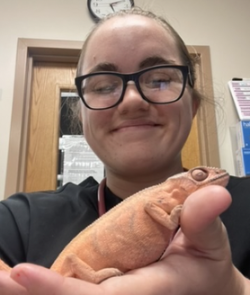Whether you’re pursuing an externship, looking for a mentorship opportunity, or searching for your first position as a DVM, interviewing is an art that every veterinary student needs to master. While these can be anxiety-inducing situations for many, there is good news: with the right preparation and mindset, you can turn what might feel like an intimidating experience into an opportunity to find the perfect fit for your career goals with these veterinary interview tips.
VetEvolve’s Ashley Anderson, our Student Programs Partner, recently sat down to share some of her top veterinary interview tips — drawn from her years of experience in working with veterinary school students and working in the industry. Let’s get started!
Future Vets! Interested in learning more about the opportunities and the ways VetEvolve supports your career? Explore our externship and mentorship program support here.
7 Veterinary Interview Tips to Find Your Perfect Fit
Be Authentically You
Your journey to veterinary medicine is unique — embrace it! Whether you waited tables to help pay for school or devoted your summers to shelter work, these experiences shape who you are as a professional. Remember, interviewers aren’t just looking at your clinical skills; they’re trying to get to know you as a person. Your diverse experiences often reveal valuable soft skills like communication, adaptability, and work ethic.
Do Your Homework
Walking into an interview without researching the practice is like starting surgery without reviewing the patient’s history — you’re setting yourself up for complications! Here’s how to prepare:
- Study the facility’s website and social media presence
- Prepare thoughtful questions about their practice philosophy
- Show interest in specific aspects of their work
- Don’t be afraid to ask challenging questions about things that matter to you, such as:
- Pain management protocols
- Anesthesia plans
- Continuing education opportunities
- Work-life balance initiatives
Remember, you’re not just being interviewed — you’re interviewing them too. This is your chance to evaluate whether the practice aligns with your values and career goals.
Know What You Want in a Mentorship
Before walking into any interview, get crystal clear about your needs. You should be able to identify the areas where you want to grow and be upfront and honest about the type of experience you’re looking for. For instance: If you need more hands-on time with dental procedures, say so. Looking to develop stronger surgical skills? Make that known.
When you understand your “must-haves” and “nice-to-haves,” you’re better positioned to find a role that will help you thrive. This clarity also shows potential employers that you’re serious about your professional development.
Everything Counts (Yes, Everything!)
Here’s an insider secret: your interview starts the moment you step onto the property and doesn’t end until you’re off it. Experienced interviewers are watching how you:
- Interact with support staff
- Handle unexpected situations
- Talk about previous experiences
- Discuss patients and clients
- Manage your energy throughout the process
Bring positive energy to every interaction. That friendly chat with the receptionist? It matters. Your response to a barking dog in the waiting room? That matters too.
The Veterinary World is Smaller Than You Think
According to the American Veterinary Medical Association AVMA, veterinarians make up less than 0.1% of the population; our professional community is incredibly tight-knit. This means:
- Word travels fast about both positive and challenging experiences
- Professional relationships matter immensely
- “Ghosting” or unprofessional behavior can have long-lasting consequences
If you decide to pursue another opportunity, that’s perfectly fine — just communicate professionally. A simple “Thank you for the opportunity, but I’ve decided to accept another position” goes a long way.
Take Your Time with Decisions
Feeling pressured to accept an offer immediately? Take a breath. It’s completely acceptable to ask for time to consider the offer and to review the contract carefully. You should feel comfortable asking for time to seek mentorship or guidance about the decision and to consider the long-term implications.
Remember, many contracts involve multi-year commitments with specific terms about early departure. Making the right decision now can save a lot of stress later.
Nail the Common Questions
Some questions appear in almost every veterinary interview. Be prepared to discuss:
- Your background and journey to veterinary medicine
- Why you’re interested in their specific practice
- Your professional interests and specialties
- Your long-term career goals
- Specific scenarios you’ve handled in your training
From Veterinary Interview Tips to Complete Career Support, Turn to VetEvolve
Remember, the best interviews feel like conversations rather than interrogations. By being prepared, authentic, and professional, you’re not just working to secure a position — you’re taking the first step in building your professional network and reputation in the veterinary community. The right opportunity is out there and with thoughtful preparation and authentic presentation, you’ll find it!
At VetEvolve, we make finding those perfect-fit opportunities for you a priority. From our unique approach to veterinary practice partnerships to comprehensive support for mentorship and externship opportunities, VetEvolve works with you to build the veterinary career you’ve dreamed of. Connect with our team today to learn more.


